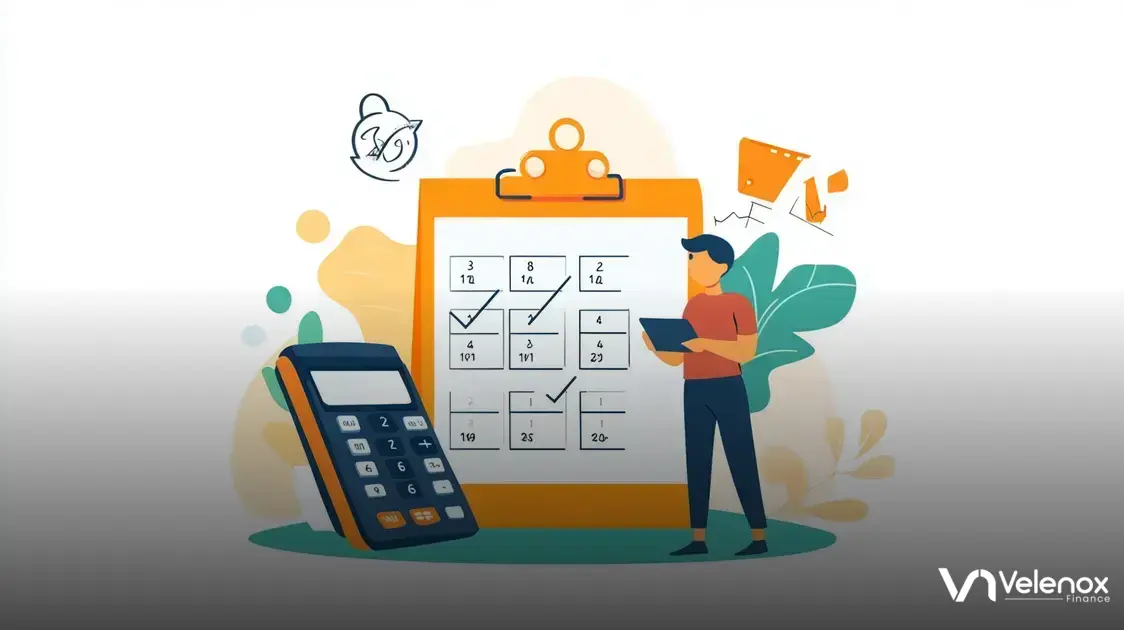Loan repayment can be a daunting task, but it is essential for maintaining financial health.
Understanding your options and strategies for loan repayment can help you manage debts effectively.
Understanding Loan Repayment
Understanding loan repayment is crucial for anyone who has borrowed money.
It refers to the process of paying back borrowed funds, plus any interest charged.
Knowing how this works can help you avoid pitfalls and manage your debts wisely.
What is Loan Repayment?
Loan repayment typically involves making scheduled payments over time until the amount borrowed is fully paid off.
Each payment usually covers a portion of the principal and interest. Understanding these components can help you devise an effective repayment plan.
Why is Loan Repayment Important?
Prompt loan repayment is vital to maintain a good credit score. A strong credit score can lead to better loan terms and lower interest rates in the future.
Delaying payments can result in penalties and negative impacts on your financial future.
When Does Loan Repayment Start?
Loan repayment usually begins after a grace period, which may vary by lender or type of loan.
It’s important to understand when your repayment journey starts to plan your budget accordingly.
Different Loan Types
Loan repayment varies by type of loan, including student loans, mortgages, and personal loans.
Each type comes with unique terms, so it’s important to familiarize yourself with the rules governing your specific loan.
By grasping the basics of loan repayment, borrowers can make informed decisions, avoid common pitfalls, and manage their finances effectively.
Don’t underestimate the importance of understanding this aspect of borrowing.
Types of Loan Repayment Plans
Choosing the right repayment plan is essential for managing your loan. Here are some common types of loan repayment plans:
1. Standard Repayment Plan
This plan requires fixed payments over 10 years. It’s one of the most straightforward options, making budgeting easier.
2. Graduated Repayment Plan
This plan starts with lower payments that gradually increase. It’s suitable for borrowers expecting to earn more in the future.
3. Extended Repayment Plan
The extended plan allows for a longer repayment term, usually up to 25 years, with lower monthly payments, but you pay more in interest over time.
4. Income-Driven Repayment Plans
This group of plans adjusts your monthly payment based on your income.
They can include options like Income-Based Repayment (IBR) and Pay As You Earn (PAYE).
5. Consolidation Loans
With a consolidation loan, you combine multiple loans into one, simplifying repayments.
However, this might extend your repayment period.
6. Interest-Only Repayment Plan
This allows you to pay only the interest for a certain period. It can be useful for cash flow management but leads to a higher principal balance later on.
Each repayment plan has its pros and cons. Evaluate your financial situation and goals to select the best option for you.
Benefits of Timely Loan Repayment

Timely loan repayment offers several advantages that can improve your financial health. Here are some key benefits:
1. Improved Credit Score
Making payments on time boosts your credit score. A higher credit score makes it easier to get approved for future loans with lower interest rates.
2. Avoiding Late Fees
Paying on time helps you avoid late fees. These charges can add up and make your debt harder to manage, so timely payments are cost-effective.
3. Lower Interest Payments
Many loans have fees or higher interest rates for late payments. Staying current can save you money over the life of the loan.
4. Financial Peace of Mind
When you repay loans on time, it reduces financial stress. You can focus on other important areas of your finances without worrying about missed payments.
5. Better Loan Terms in the Future
A strong repayment history can lead to better loan terms when you apply for new credit. Lenders often offer better rates and terms to responsible borrowers.
6. Increased Trust with Lenders
Timely payments build trust with lenders. This can lead to easier access to loans in emergency situations or larger amounts when needed.
By understanding the benefits of timely loan repayment, you can motivate yourself to stay on track and maintain a healthy financial status.
How to Prepare for Loan Repayment
Preparing for loan repayment is essential to ensure a smooth process. Follow these steps to help you get ready:
1. Understand Your Loan Terms
Review the details of your loan, including the interest rate, repayment schedule, and any fees. Knowing these terms will help you plan better.
2. Create a Budget
Make a budget that includes your monthly loan payments. Track your income and expenses to see where you can save money for repayments.
3. Set Up a Payment Plan
Decide whether you want to use automatic payments or manual payments. Automated payments can help you avoid missing due dates.
4. Build an Emergency Fund
An emergency fund can help cover payments if unexpected expenses arise. Aim for at least 3-6 months’ worth of payments in your fund.
5. Learn About Repayment Options
Research different repayment plans to find one that suits your financial situation. Some plans offer flexibility based on your income.
6. Keep Communication Open with Lenders
If you anticipate difficulty making payments, reach out to your lender sooner rather than later. They may offer solutions or adjustments.
7. Stay Informed
Regularly check your account information and stay updated on any changes to your loan or assistance opportunities that may be available.
By taking these steps, you can effectively prepare for loan repayment and manage your debt confidently.
Common Mistakes in Loan Repayment
Common mistakes in loan repayment can lead to unnecessary stress and financial strain. Here are some of the most frequent errors borrowers make:
1. Missing Payments
Failing to make payments on time can result in late fees and damage your credit score. Always keep track of due dates to avoid this mistake.
2. Ignoring Loan Terms
Not fully understanding your loan terms can lead to confusion and missed opportunities for better repayment options. Take time to review all the details.
3. Overlooking Fees and Charges
Many loans include fees that can pile up quickly if unnoticed. Pay attention to origination fees, late fees, and prepayment penalties.
4. Not Setting a Budget
Neglecting to create a budget that includes loan payments can make managing your finances challenging. Always allocate funds for your repayment within your budget.
5. Failing to Communicate with Lenders
If you’re having trouble making payments, not reaching out to your lender can make the situation worse. They may offer solutions or adjustments.
6. Sticking to One Repayment Plan
Not exploring different repayment options may limit your ability to manage your loan effectively. Review available plans regularly to find the best fit.
7. Allowing Debt to Accumulate
Taking on new debts without managing existing ones can lead to a cycle of repayment confusion. Always prioritize paying off existing loans.
By recognizing these common mistakes, you can take proactive steps to ensure successful loan repayment and maintain better financial health.
Strategies for Successful Loan Repayment

Strategies for successful loan repayment can significantly ease your financial burden. Here are some effective approaches to consider:
1. Create a Repayment Plan
Outline your repayment schedule based on your loan terms. Include start dates, due dates, and amounts due to stay organized.
2. Automate Payments
Set up automatic payments with your bank to ensure your payments are made on time. This can help you avoid late fees and maintain a good credit score.
3. Prioritize Higher Interest Loans
Focus on paying off loans with higher interest rates first. This strategy can save you money on interest in the long run.
4. Make Extra Payments
If possible, pay more than the minimum required amount each month. This can help you pay off the loan faster and reduce the total interest paid.
5. Keep Track of Your Progress
Regularly review your repayment status. Knowing how much you have left to pay can motivate you to stay on track.
6. Communicate with Your Lender
Don’t hesitate to reach out to your lender if you encounter issues. They may offer flexible solutions or adjustments to your repayment plan.
7. Seek Financial Advice
If you’re struggling, consider speaking to a financial advisor. They can provide personalized strategies tailored to your financial situation.
Applying these strategies can help you manage your loan repayment effectively and achieve financial stability.
The Impact of Loan Repayment on Credit Score
The impact of loan repayment on credit score is significant and can influence your financial future. Here are key points to understand:
1. Payment History Matters
Your payment history is one of the most important factors in calculating your credit score.
Timely loan repayments show lenders you are responsible and can manage debt effectively.
2. Late Payments Can Hurt You
Missing payments can lead to negative marks on your credit report.
These late payments can stay on your report for up to seven years and significantly lower your score.
3. Credit Utilization Ratio
Loan repayment affects your credit utilization ratio, which compares your total credit used to your total credit available.
Lower utilization generally results in a better score.
4. Length of Credit History
Keeping loans for longer periods and making timely repayments can positively impact the length of your credit history, which improves your score.
5. Mix of Credit Types
Having a mix of credit (like loans and credit cards) can be beneficial.
Regular loan repayments demonstrate your ability to handle different types of credit responsibly.
6. Credit Inquiries
When you apply for loans, lenders conduct hard inquiries that can temporarily lower your score.
However, if you manage repayments well, these effects diminish with time.
Understanding how loan repayment affects your credit score allows for informed decisions, potentially leading to better rates on future loans and credit.
In Conclusion: Mastering Loan Repayment
Understanding loan repayment is essential for managing your finances effectively.
By familiarizing yourself with the different types of repayment plans, benefits of timely payments, and strategies for success, you can take control of your debt.
Avoiding common mistakes and recognizing the impact of loan repayment on your credit score will further empower you to make informed financial decisions.
Through consistent and responsible repayment practices, you can achieve financial stability and open the door to better loan opportunities in the future.
Remember, staying proactive and informed is key to mastering your loan repayment journey.





